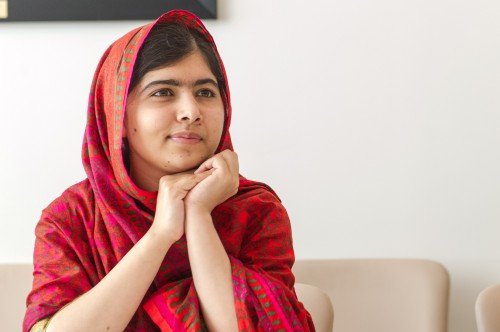By Madeline Scovotti
The 17-year-old Nobel Peace Prize recipient was awarded earlier this month for her advocacy work, fighting for girls’ rights to education around the globe.
In order to begin helping millions of children, Malala has founded the Malala Fund, which invests in local educational initiatives for girls in Pakistan, Nigeria, Kenya, and in Jordan, where it focuses on Syrian refugees, according to CNN.
Anita Sen, Suffolk’s theater department coordinator, finds Yousafzai’s level of conviction and drive towards her cause to be something all members of the Suffolk community can draw inspiration from. “It’s frustrating for me sometimes to look at students who are thinking about different issues who are still hesitant to do anything or step up for their cause. It’s incredible to me someone that young already has that much drive.”

In 2009, Yousafzai began an anonymous blog for BBC in which she revealed to the world the struggles and injustices her and her fellow classmates were facing. Over the next few years, she became a public advocate for girls’ education, winning awards including as Pakistan’s first National Youth Peace Prize.
Her life was threatened, her rights to her education were limited, and a chance to the head nearly ended her life. But that did not deter Malala Yousafzai from the work that led her to become the youngest recipient ever of the Nobel Peace Prize.
Yousafzai’s fight for equal female education began with her own desire to be able to go to school and get an education. According to her autobiography, “I Am Malala,” Yousafzai grew up in the Swat District of northwest Pakistan where her father, Ziauddin, ran a public school and was a leading educational advocate. Despite having access to her father’s school and support, the Malala Fund website notes that the intensifying military presence of the Taliban limited Yousafzai’s and her fellow female classmates’ access to an education, forcing the young Pakistani girl to fight for her education.
Her outspoken views and criticism of the Taliban nearly cost Yousafzai her life on Oct. 9, 2012, according to CNN. On her way home from school, a masked gunman entered Yousafzai’s school bus and asked for her by name. She was shot with a single bullet that went through her head, neck, and shoulder, leaving her barely alive and in critical condition. Her assailant got away, as recalled by Yousafzai in her autobiography.
According to CNN, less than three months later she was discharged from the hospital with no major brain or nerve damage. She was ready to pick up her cause right where she left it.
The attempt on her life created global attention and her bring thrust into the international spotlight brought the world’s attention to the strife faced by millions of children around the world who are denied access to an education.
The main goal of the fund, according to the Malala Fund website, is to bring awareness to the social and economic impact that education has on empowering girls to raise their voices, unlock their potential, and demand change. According to the Malala Fund, 66 million girls are out of school around the world and every three seconds a girl becomes a child bride. The fund goes on to say that without education, girls are trapped in a cycle of poverty.
In her recently published autobiography, I Am Malala, Yousafzai writes, “When the whole world is silent, even one voice becomes powerful. One child, one teacher, one book and one pen can change the world.” On the Malala Fund website, Yousafzai says she raises her voice, “not so that I can shout, but so that those without a voice can be heard.”
At the young age of 17, Malala Yousafzai has become a recognized global advocate for girls’ education, has established a fund to help children around the world, and has become the youngest recipient of the Nobel Peace Prize. She writes in her autobiography, “I don’t want to be thought of as the ‘girl who was shot by the Taliban’ but the ‘girl who fought for education.’” This is the cause to which I want to devote my life.”





